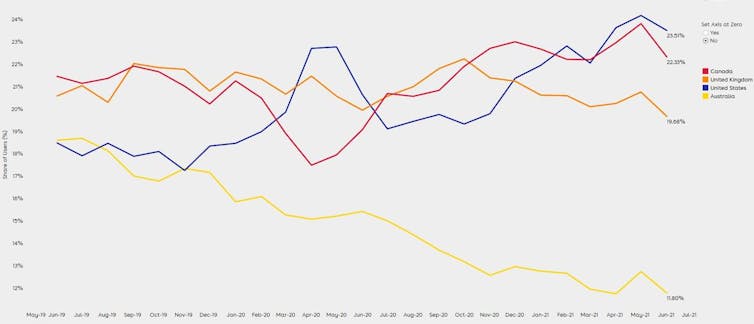Australia's international education market share is shrinking fast. Recovery depends on unis offering students a better deal
- Written by Ian Anderson. Palawa, Deputy Vice-Chancellor Student and University Experience, Australian National University
Governments and universities are planning for the recovery of our international student market once Australia can start easing border closures that have had huge impacts on universities and the economy. The situation is becoming increasingly urgent: a new ANU-commissioned analysis shows an alarming fall in international student demand for our universities. It’s less than two-thirds of what it was before the pandemic.
The following chart from the IDP Connect report for ANU shows Australia’s share of this market (the yellow line) has fallen to 11.74% from over 18% two years ago. Our key competitors — the UK, USA and Canada — have increased their share or remained stable.
 Trends in leading provider countries’ share of international student market demand over past two years.
IDP Connect IQ, Author provided (no reuse)
Trends in leading provider countries’ share of international student market demand over past two years.
IDP Connect IQ, Author provided (no reuse)
As Australia moves out of winter and vaccination rates rise, it is hoped current regional outbreaks of COVID-19 will settle. But no-one should assume international student numbers will immediately rebound to pre-pandemic levels once borders open.
Other recent global surveys show students’ perceptions of how countries have handled the pandemic are affecting their decisions on study destinations.
And research released this week shows student sentiment about Australia as a destination continues to decline. The IDP Connect Crossroads research also finds 36% of surveyed students are likely to switch destinations if it means they can gain face-to-face teaching earlier.
 IDP Crossroads V, Author provided (no reuse)
Over the rest of this year and early 2022, we all need to focus on our post-COVID recovery. South Australia has been given the all clear to begin a quarantine program for international students. A NSW-based program has been approved by the state government and the Commonwealth government has signalled support for the plan. Other proposals are in the pipeline.
Read more:
The government keeps shelving plans to bring international students back to Australia. It owes them an explanation
Helping students feel they belong is vital
The research released this week shows worrying trends in student perceptions of Australia in terms of student welfare and being a welcoming destination. We see continuing declines across all metrics: response to coronavirus, student and citizen safety, and international student policies including post-study work visas.
To recover their international student markets Australian universities will need to develop and communicate a much stronger focus on providing a world-class student experience. They must take action inside and outside the classroom.
One key focus must be on building social cohesion for international students across many university settings. They do not want to feel isolated and excluded from the university community, which undermines their student experience.
Stronger social cohesion would address problems that international students have long identified: racism, loneliness and high levels of stress. It would also provide a way to tackle the recently documented political harassment of some international students.
Not all these issues are new concerns. They are not unique to international students. Domestic students confront these issues, too. Both groups will benefit it we get this right.
Having said that, at ANU our Student Satisfaction Survey data show a gap between the student experience for domestic and international students. This is consistent with other universities. Everyone needs to work harder inside and outside the classroom to close that gap.
Research shows stronger social relationships are key to preventing psychological distress for university students. Building social cohesion involves fostering shared values and connected communities. This, in turn, creates a sense of belonging and shared purpose and reduces loneliness.
Universities can help international students to make connections with local students and the communities in which they live. Educators and on-campus services need a range of strategies to strengthen the social fabric in which international students live and learn. These prevention strategies and well-being services must be accessible and culturally attuned to their needs.
IDP Crossroads V, Author provided (no reuse)
Over the rest of this year and early 2022, we all need to focus on our post-COVID recovery. South Australia has been given the all clear to begin a quarantine program for international students. A NSW-based program has been approved by the state government and the Commonwealth government has signalled support for the plan. Other proposals are in the pipeline.
Read more:
The government keeps shelving plans to bring international students back to Australia. It owes them an explanation
Helping students feel they belong is vital
The research released this week shows worrying trends in student perceptions of Australia in terms of student welfare and being a welcoming destination. We see continuing declines across all metrics: response to coronavirus, student and citizen safety, and international student policies including post-study work visas.
To recover their international student markets Australian universities will need to develop and communicate a much stronger focus on providing a world-class student experience. They must take action inside and outside the classroom.
One key focus must be on building social cohesion for international students across many university settings. They do not want to feel isolated and excluded from the university community, which undermines their student experience.
Stronger social cohesion would address problems that international students have long identified: racism, loneliness and high levels of stress. It would also provide a way to tackle the recently documented political harassment of some international students.
Not all these issues are new concerns. They are not unique to international students. Domestic students confront these issues, too. Both groups will benefit it we get this right.
Having said that, at ANU our Student Satisfaction Survey data show a gap between the student experience for domestic and international students. This is consistent with other universities. Everyone needs to work harder inside and outside the classroom to close that gap.
Research shows stronger social relationships are key to preventing psychological distress for university students. Building social cohesion involves fostering shared values and connected communities. This, in turn, creates a sense of belonging and shared purpose and reduces loneliness.
Universities can help international students to make connections with local students and the communities in which they live. Educators and on-campus services need a range of strategies to strengthen the social fabric in which international students live and learn. These prevention strategies and well-being services must be accessible and culturally attuned to their needs.
 When choosing a destination, international students value face-to-face teaching and being made to feel part of the university community.
Shutterstock
Read more:
5 ways Australia can get ahead in attracting and retaining Chinese international students
Protect students from harassment and racism
Stronger social cohesion can help counter racism. Universities can also communicate better about international students’ valuable contributions to our communities.
Local governments, businesses and communities all have important roles to play here. Universities can work with these groups to ensure international students have better access to accommodation and jobs. Being made to feel welcome both on and off campus sends a powerful signal to students that they are safe and included.
Australian Human Rights Watch recently highlighted on-campus harassment of international students who have different political views to the government of their home country. It reported students were self-censoring to avoid threats, harassment and surveillance.
Read more:
Academic freedom is paramount for universities. They can do more to protect it from China's interference
International students should feel safe from political harassment on campus. They need to be able to express political views in class and know it won’t affect their assessment. Universities should provide appropriate support to students who have suffered political harassment.
Academic freedom is an important principle that underpins university education in Australia. We can help international students understand its value through improving social cohesion. University leaders can also reinforce this message by strengthening the regulation of academic freedom in student codes of conduct.
The National Strategy for International Education only tackles student experience at a high level. However, this strategy is being refreshed. This is a time for policymakers and universities to sharpen their focus on the student experience and social cohesion for international students as we prepare for post-COVID recovery.
As borders re-open, it will be more important than ever for Australian universities to show they are committed to providing international students with a world-class student experience. It’s critical for their post-pandemic recovery.
When choosing a destination, international students value face-to-face teaching and being made to feel part of the university community.
Shutterstock
Read more:
5 ways Australia can get ahead in attracting and retaining Chinese international students
Protect students from harassment and racism
Stronger social cohesion can help counter racism. Universities can also communicate better about international students’ valuable contributions to our communities.
Local governments, businesses and communities all have important roles to play here. Universities can work with these groups to ensure international students have better access to accommodation and jobs. Being made to feel welcome both on and off campus sends a powerful signal to students that they are safe and included.
Australian Human Rights Watch recently highlighted on-campus harassment of international students who have different political views to the government of their home country. It reported students were self-censoring to avoid threats, harassment and surveillance.
Read more:
Academic freedom is paramount for universities. They can do more to protect it from China's interference
International students should feel safe from political harassment on campus. They need to be able to express political views in class and know it won’t affect their assessment. Universities should provide appropriate support to students who have suffered political harassment.
Academic freedom is an important principle that underpins university education in Australia. We can help international students understand its value through improving social cohesion. University leaders can also reinforce this message by strengthening the regulation of academic freedom in student codes of conduct.
The National Strategy for International Education only tackles student experience at a high level. However, this strategy is being refreshed. This is a time for policymakers and universities to sharpen their focus on the student experience and social cohesion for international students as we prepare for post-COVID recovery.
As borders re-open, it will be more important than ever for Australian universities to show they are committed to providing international students with a world-class student experience. It’s critical for their post-pandemic recovery.
Authors: Ian Anderson. Palawa, Deputy Vice-Chancellor Student and University Experience, Australian National University





